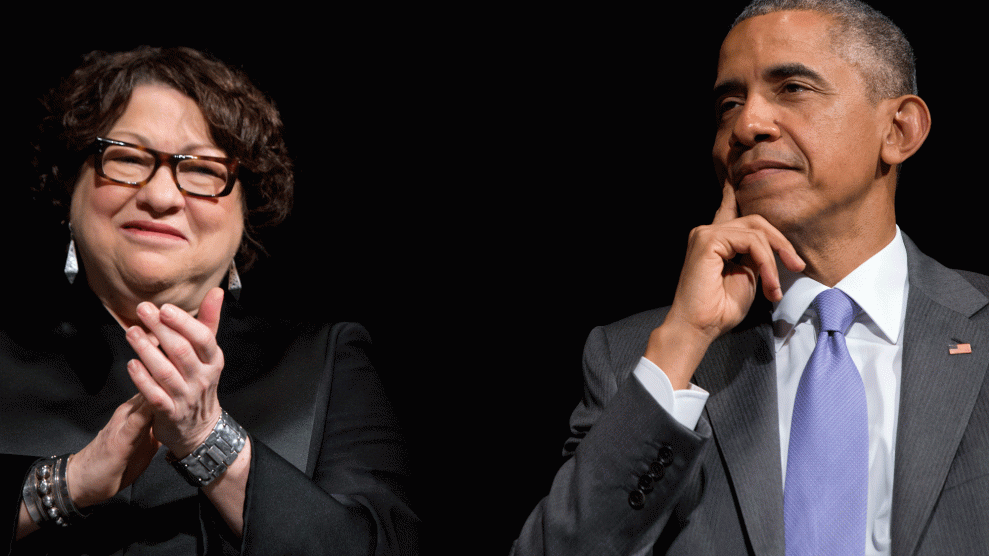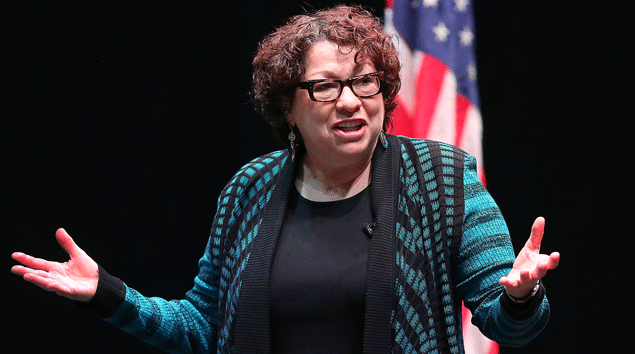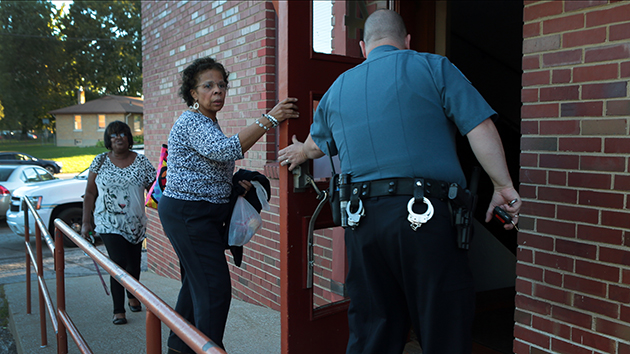
Supreme Court Justice Sonia Sotomayor and President Barack ObamaCarolyn Kaster/AP
Just before President Barack Obama announced his appointment of Sonia Sotomayor to the Supreme Court, making her the first Latina justice, he said he wanted to choose someone with life experience that provided “a common touch and a sense of compassion; an understanding of how the world works and how ordinary people live.” On Monday, she put that perspective to work in a fiery dissent in a case involving a potentially illegal police stop, excoriating her colleagues for misunderstanding the police harassment to which people of color are regularly subjected.
“Do not be soothed by the opinion’s technical language,” Sotomayor, the child of Puerto Rican parents who grew up in the Bronx, wrote to readers of her dissent, to which Justice Ruth Bader Ginsburg also signed on. “This case allows the police to stop you on the street, demand your identification, and check it for outstanding traffic warrants—even if you are doing nothing wrong.”
The case being decided, Utah v. Strieff, has spanned a decade since an anonymous tip in 2006 about alleged drug activity in a South Salt Lake City residence led officer Douglas Fackrell to spend a week surveilling people entering and exiting the house. One day, after watching Edward Strieff visit the house, Fackrell followed him to a convenience store across the street and demanded to know what he’d been doing there. He also asked Strieff for his ID; after running a check on it, learned that he had an outstanding warrant for a minor traffic violation, so he arrested him. During his search, Fackrell found meth and drug paraphernalia on Strieff, who was ultimately charged with illegal possession.
At trial, even the prosecutor conceded that Fackrell’s stop of Strieff was illegal, because he had no reasonable suspicion of any criminal activity to justify requesting his ID. But the state asked the judge to allow the drug evidence anyway, arguing that the outstanding arrest warrant merited the search. The trial court allowed the drug evidence to be introduced, and as a result Strieff pleaded guilty to lesser charges, but reserved his right to challenge the search in court. That was a smart move, as the Utah Supreme Court ultimately ruled in his favor and found that the drug evidence, tainted by the illegal stop, should never have been admitted into court.
But on Monday, the US Supreme Court, in a 5-3 decision, overturned the Utah high court on the grounds that Fackrell’s conduct was a mistake, “negligent” behavior that shouldn’t lead to the exclusion of the drug evidence. “There is no evidence that Officer Fackrell’s illegal stop reflected flagrantly unlawful police misconduct,” Justice Clarence Thomas wrote in the majority opinion. (The decision came on a day when the court was buzzing with erroneous rumors that Thomas was considering retiring.) The majority found Fackrell’s conduct mostly harmless and inconsequential, justified by the existence of the outstanding traffic warrant and hardly part of a larger pattern of misconduct.
Sotomayor disagreed vehemently, arguing that the majority, which included liberal Justice Stephen Breyer alongside the court’s conservatives, had stripped Strieff’s case of its context. “Respectfully,” she writes in her dissent, “nothing about this case is isolated.”
Sotomayor cited a list of sources that Black Lives Matter activists would cheer: Michelle Alexander and her book The New Jim Crow; Ta-Nehisi Coates, author of Between the World and Me; and the Justice Department Civil Rights Division’s report on the problems with excessive warrants in Ferguson, Missouri, a city of 21,000 where 16,000 people (including non-residents) had outstanding warrants.
Her point was to show that outstanding warrants are so common, and so widely abused, that they should never be used to justify illegal stops by police. At the time of Strieff’s arrest, she noted, Salt Lake City had a backlog of 180,000 outstanding misdemeanor warrants, so many that it was at risk of getting in trouble with the Justice Department. She cited statistics showing law enforcement’s frequent use of warrants to stop all sorts of people for no good reason, writing, “Surely we would not allow officers to warrant-check random joggers, dog walkers, and lemonade vendors just to ensure they pose no threat to anyone else.”
Sotomayor argued that Fackrell stopped Strieff illegally as part of a drug investigation, knowing that the odds were decent that his target would have an outstanding warrant for something. The Fourth Amendment and decades of Supreme Court precedent, she said, should have caused the fruits of that illegal stop to been thrown out. She reminded her colleagues of the real-world consequences of such “good-faith mistakes,” as the majority called Fackrell’s actions, describing the indignities inflicted upon people arrested after these sorts of stops: body cavity searches, handcuffing, public humiliation, and a permanent arrest record, among others.
Monday was not the first time Sotomayor has reminded her colleagues about how the real word works. In oral arguments in a death penalty case last fall, she referred to her own jailed relatives to highlight racism in jury selection.
Sotomayor concluded with a reference to Eric Garner, the New York man who was choked to death by police who were harassing him on suspicion of selling single cigarettes. “We must not pretend that the countless people who are routinely targeted by police are ‘isolated,'” she wrote. “They are the canaries in the coal mine whose deaths, civil and literal, warn us that no one can breathe in this atmosphere… They are the ones who recognize that unlawful police stops corrode all our civil liberties and threaten all our lives. Until their voices matter too, our justice system will continue to be anything but.”









